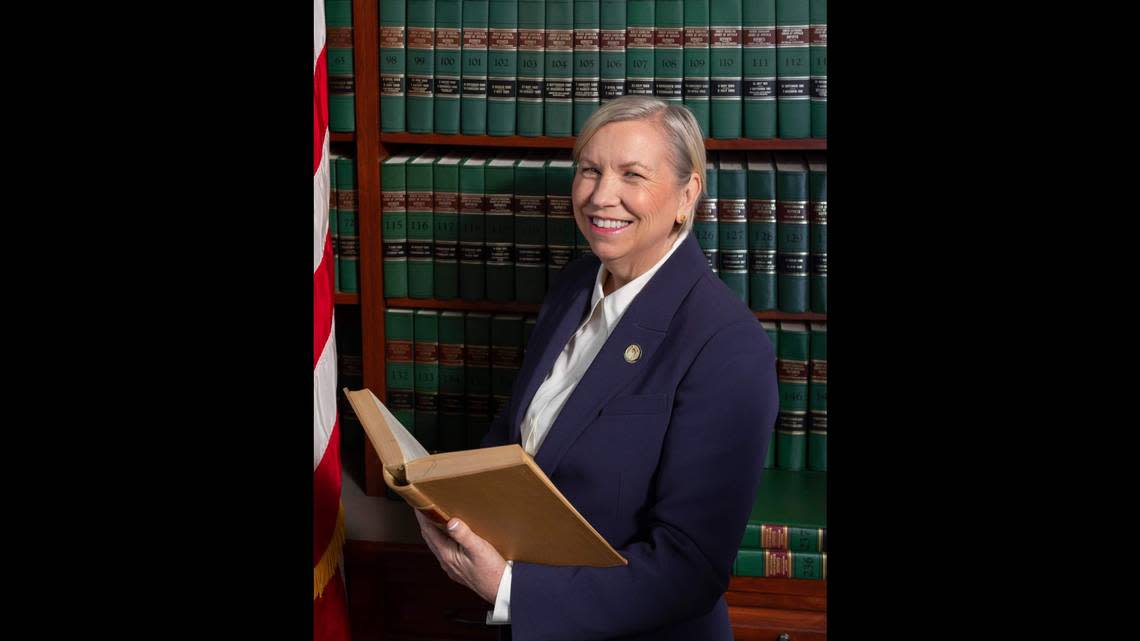GOP flips control of NC Supreme Court, after winning every statewide judicial race
Republicans flipped control of the N.C. Supreme Court in Tuesday’s elections, flipping two Democratic-held seats and giving their party back a majority on the state’s highest court for the first time in six years.
Democrats will keep their 4 to 3 majority through the end of the year. But with Tuesday’s results, Republicans took both seats on the ballot and will head into 2023 with a 5 to 2 GOP majority on the state’s highest court.
In one race, Democratic incumbent Justice Sam Ervin IV faced Republican challenger Trey Allen, a lawyer and professor who has no judicial experience but is close to Republican Chief Justice Paul Newby. In a call just after 11 p.m. Tuesday, Ervin said he had just gotten off the phone with Allen and conceded the race.
“I wished him well and told him I hope he enjoys serving on the court as much as I have,” said Ervin, who has been a judge for over a decade, most of that time on the Supreme Court.
Ervin said he hopes he’s remembered as a hard-working and apolitical member of the court, adding that “it is more important than ever” that judges refrain from acting as partisan politicians.
In the other race, an empty seat with no incumbent, two current N.C. Court of Appeals judges competed for a promotion to the state’s highest court. They are Democrat Lucy Inman and Republican Richard Dietz. Inman conceded to Dietz late Tuesday night.
Both Allen and Dietz won with around 53% of the vote.
It’s the second election in a row Republicans have swept the statewide judicial races. Democrats held six of the seven Supreme Court seats heading into the 2020 elections. But after Republicans won all three races in 2020, and then both seats this year, the court will now have a five-seat GOP majority.
Control of the NC Supreme Court is up for grabs. These issues are at stake.
In addition to the two Supreme Court seats on the ballot, four seats on the 15-member N.C. Court of Appeals are on the ballot.
Those have not attracted the same level of spending and scrutiny, however, for a few reasons. While many lawsuits that get appealed do end at the Court of Appeals, the highest profile ones almost always reach the Supreme Court, regardless of how the Court of Appeals rules.
In the Court of Appeals races, the results late Tuesday night — with 99% of precincts reported — were closely tracking the results of the Supreme Court races.
▪ Julee Flood (R) appeared to defeat Carolyn Thompson (D).
▪ Donna Stroud (R) appeared to defeat Brad Salmon (D).
▪ John Tyson (R) appeared to defeat Gale Adams (D).
▪ Michael Stading (R) appeared to defeat Darren Jackson (D), the only Court of Appeals incumbent to lose.
National groups spending millions
Outside groups have spent millions of dollars on ads in the Supreme Court races, each side flooding the airwaves to accuse the other side’s candidates of being bad for people’s safety.
Crime isn’t the real focus of the people paying for those ads, however — it’s gerrymandering.
The Supreme Court has the final say over whether the maps that the legislature draws for Congress, as well as for the N.C. Senate and N.C. House of Representatives, are unconstitutionally gerrymandered. State and national groups affiliated with the Democratic and Republican parties have dumped at least $8.6 million into Supreme Court ads this year. That’s more than all four candidates, combined, have raised from their supporters.
The court handles plenty of political cases, ranging from power struggles between the legislature and governor to issues of school funding, voter ID, racial bias in the justice system and more. However, its ability to decide gerrymandering cases gives the court the ability to affect national politics, too.
In 2021 Republican lawmakers drew new maps that would’ve all-but-guaranteed GOP candidates to win 10 of 14 U.S. House seats in North Carolina, The News & Observer has reported, even if Democrats won a majority of the vote statewide.
The three Republican justices on the N.C. Supreme Court said they would’ve let those maps stand. But the four Democrats on the court outvoted them, 4-3. So the court overturned the maps as unconstitutional and then hired outside experts to draw less skewed districts, which are expected to more closely reflect the statewide vote.
GOP lawmakers, however, are expected to try redrawing the districts again next year. So whether Republicans or Democrats control the Supreme Court after Tuesday’s election will likely go a long way toward determining how aggressive lawmakers can be in gerrymandering the lines to give themselves an advantage in future elections.





